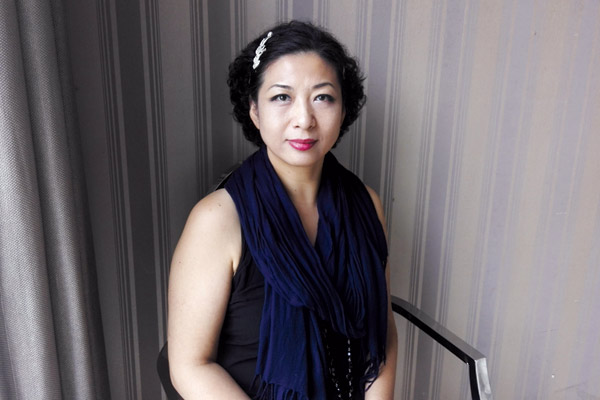
 |
| Wang Lihong believes you do not need to be rich to help others. LI JING/ China Daily |
Wang Lihong said people were surprised when they heard she was engaged in philanthropy.
“They said charity is a business of rich people, as it costs money,” Wang recalled. “But I believe it is for everybody, whether rich or poor. Even if I have only 100 yuan ($16), I can help others.”
In 2011, she started offering free job consultancy to Chinese students studying abroad. In April of that year, she organized a dialogue between companies and Chinese students at the University of California, Berkeley.
“About 50 Chinese students took part, and I invited company heads from Huawei and China Unicom’s US offices to talk face to face about job opportunities in the US and back in China,” she said.
In the following months, she continued such events at more universities in California.
Her interest in helping Chinese students in the US was inspired when she hosted an education radio program in Chinese in Silicon Valley in 2011.
“On the program, I invited some student guests to talk about their lives and studies in the US and found they all had big concerns about jobs in the US,” she said.
“They were anxious and urgently needed some connections with enterprises, for internship and job opportunities.”
According to Wang, it’s hard for Chinese graduates to find job opportunities in the US, except for a small group of students who are outstanding in academics and productivity.
“Things are even harder for students studying nontechnical majors such as business and law, and the majority have to return to China,” she said.
After a year, she found it more helpful to share facts with students before they embarked on their US education.
So she switched her focus back to China and in 2012 started running the Sino-US Education and Career Forum on an annual basis.
“Every year, I contribute up to $10,000 to prepare the forum and stay here for about two months,” she said. “The money is partly from my work as a teacher in after-school centers in the US.”
But to do philanthropy in China is not a smooth road.
One week before the forum on June 6 in Beijing, she was suddenly told that the venue for the event was not available. She had to find another place and contact participants.
“I have to handle those unexpected things once in a while,” she said.
At the last minute, she got a free space in the Beijing Planetarium.
Planetarium director Zhu Jin, who has been one of Wang’s friends for years, said, “It is very difficult to do such events in Beijing, as the city is overflowing with events and hardly attract people’s attention.”
The forum, although well-organized with professionals from enterprises and education institutions, drew a small audience.
Que Dengfeng, the president and co-founder of Juesheng, a website promoting study opportunities in the US to the Chinese market, is a volunteer at the forum. He said, “In China, people are aware that doing free public services is like being a martyr, because it requires pouring money into it and convincing others to believe in you and believe what you are doing is not to make profits.”
He said Wang is persistent and civic-minded, and that is why he wanted to join her.
The 45-year-old talked fast, even for a Chinese person, and had a sense of passion that can appear blunt.
In 1996, when she was 26, she moved to the US with her former husband. She attended local school to study English and went to a community college to study education.
After about a decade of working at after-school centers teaching Chinese and mathematics, she applied for a job as a radio anchor when she was 40. Although she was only in the position for two years, she increasingly built social relations thanks to her flair for networking, which also contributes to her current work in nonprofit programs.
“I like to be under the spotlight, and I’m not used to accepting the status quo,” she said.
Wang Jun, the cultural counselor at the Chinese consulate general in San Francisco, said Wang is enthusiastic in promoting public good and has contributed to the cultural and educational exchanges between the two countries.
Her latest activity is the mini-forum at the China Conservatory to talk about art students’ lives in overseas education, and she plans to speak at more schools in Beijing.
“We are still at the budding stage, but I believe, as I keep working on the public matters, more people will join us.”
lijing2009@chinadaily.com.cn